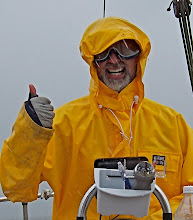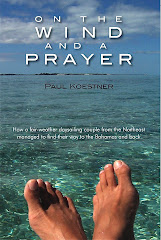It's a beautiful day in the neighborhood
Deb and I had been enjoying
some face time with relatives on terra
firma while our Laura Lynn sat comfortably affixed to the anchorage at
Three Mile Harbor on the north side of the south fork of the island called Long
Island for good reason, in the state of New York. I believe only women are capable of
following that description through to the end, but check the map and it’ll all
make sense.
For me there’s always
something about travel taken on a sailboat that makes me wish I’d taken up flying
planes as a hobby. For several days we’d been tracing a meandering path around
peninsulas and islands, getting further diverted by shoals, weather systems and
equipment malfunctions. But that’s the charm of sailing, isn’t it? I recently
heard from my pal Ron about a trip he and his daughter had taken aboard their
Alberg 35. They’d cut their planned adventure short to circumvent approaching weather.
Upon returning home after two days out, they’d hopped in a car and visited the harbor
they’d just returned from, just to have dinner. Northport really is a cute
town. You should visit it somehow.
During our planned return to
Block Island, we visited Deb’s prized cousins Todd and Kat, and their two
precocious sons. These are authentic water people, Todd having proposed to Kat as
they waited for a nice wave set while perched on their respective surfboards.
He did so wordlessly, letting the banner towed by one of the pilots working the
beach banner ad trade (I’m telling you, a plane will get the job done) speak for him.
If that isn’t cool, I don’t know what is.
Todd had recently acquired a
bigger boat, naturally, one with a pair of Chevy engines, so you know we
could’ve gotten somewhere on it right away, but when we considered an evening
of frivolity and the many stages it would take to actually get a crew out onto
the water and to a destination where barbecue was in the offing, we opted
instead to all hop in the family SUV and hightail it to Montauk. Boats are
definitely fun, but an essential nautical skill is the ability to rationally assess
and manage time.
While enjoying shore life, we
were made aware of the impending visit of the first named tropical storm of the
season. Had Deb and I driven out to see our relatives, I would’ve gone, “Well
now, that’s interesting. Pretty early start to the season.” Instead, with our
boat anchored three days from her home port, I went something like, “Son of a
freaking bitch! You have got to be kidding me!”
You really have to admire the
degree to which meteorologists can predict the timing, path and severity of
large-scale weather systems these days. That admiration, however, is dampened
by prognostications that target your present location. Deb and I had to decide
whether to hunker down or skedaddle.
I tend to be a hunker-downer
type. Deb is a skeedaddler. She won the battle of strategies, aided and abetted
by swarms of no-see-ums that hounded us as we bid adieu to land and hopped into
the smallest tender ever to have been built by a West Marine vender. I
considered what it would be like to sit for two days on a boat with nothing
much to do except swat insects while waiting for a hurricane to plough through.
We were up at the crack of
dawn, or thereabouts, having worked out the math on how to hit Plum Gut at
slack tide. I was all over that task for the second time, having come through
the infamous slot and into the protective cradle of Long Island’s East End several
days earlier. Once again I was priding myself at my finely honed seamanship,
feeling very much like a sailor who’d done his homework, when the teacher that
is Mother Nature threw in an opportunity for extra credit.
Fog started to roll in just
as we approached that swirling confluence of water and boats that is Plum Gut.
As the veil was drawn about us, we began to hear foghorns distressingly close
to our position. I had a déjà vu moment from a trip many years earlier, when
the same sort of thing happened as we approached the boulder-lined breakwater
at Cape May.
Let me know if we're going to die now
Back then I followed the lead
of another vessel that had issued a security
call, indicating it’s position, direction and intent. I did the same again
this day, and was greeted by the voice of a ferry captain, who requested I
switch to channel 13, which I did. If he’d asked me to turn around and go back
to where I came from, I would’ve done that too. As an aside, the term “ferry
captain” just doesn’t pack the kind of manly punch it ought to. This guy was commandeering
a vessel that could destroy us in a New York instant. It is big, has limited
ability to maneuver, and carries a payload of humans with time-sensitive agendas.
They might have felt it if their chauffeur had sliced a small boat in half on
the way to Connecticut, but they might not if they’d been snoozing in their cars.
Channel 13 is the recognized frequency
used by commercial traffic. I had my conversation with the ferry captain, who
said he had me on his radar, which was soothing. But there were a lot of other
vessels out there, which was not. We had no radar. What we had was a whistle. I
commenced blowing into it, and its shrill pitch made my ears ache. Coast Guard
protocol requires a vessel to issue a warning blast at least once every two
minutes in limited visibility, and the conditions called for more frequent toots.
Jesus, there were horns all around us. I was hyperventilating as this little
whistle vacuumed the air from my lungs after a two-second report.
It then dawned on me that I
had an option onboard, a conch horn born from our trip to the Bahamas those
many years ago. It had a note much like that which I was hearing from the
invisible fleet around us, and a restricted air passage that let me extend the length
of my warning without passing out.
I made a radio announcement
to anyone listening that I’d shifted from whistle to conch horn, figuring this might
help anyone tracking our progress. I was met with radio silence. In retrospect
I suspect the listeners out there were laughing off-mic over my needless
details (I tend toward more explanation for my behavior than less), and I bet that
if one had opted to respond, he might’ve said, “Captain, if you want to eat a can
of baked beans and can fart loud enough, that’ll work too.”
What they look like when you can see them
We never spotted a ferry, but
we did watch as the occasional sport fisherman ghosted by. Once we saw several
in a small parade, which I imagine is an effective schooling strategy. Deb
followed our GPS course (you just have to love GPS) through the Gut, and
shortly thereafter the veil began to lift, too late for her satisfaction. She
told me afterward that had she known what we were in for that morning, she
would’ve voted with me to sit another couple days at anchor to let Arthur pass
us by. I have no idea what voter turnout
will be like on future trips.







2 comments:
"For me there’s always something about travel taken on a sailboat that makes me wish I’d taken up flying planes as a hobby. "
There are a lot more airplanes in the ocean than there are sailboats in the sky.
Not an original thought, but Bill Wander thought he'd bring it up here.
Bill, there is a lot more of everything at the bottom of the ocean. I find that less than consoling, but as they say, whatever floats your boat!
Post a Comment